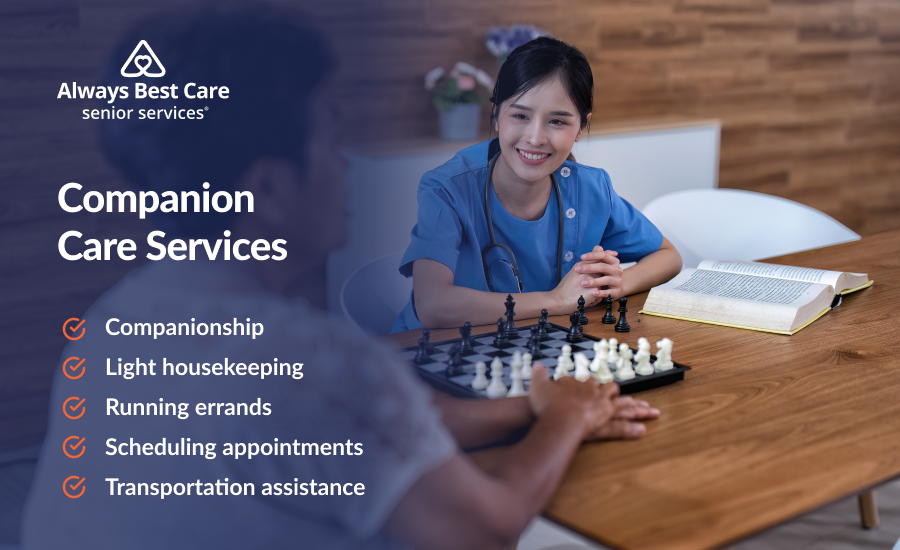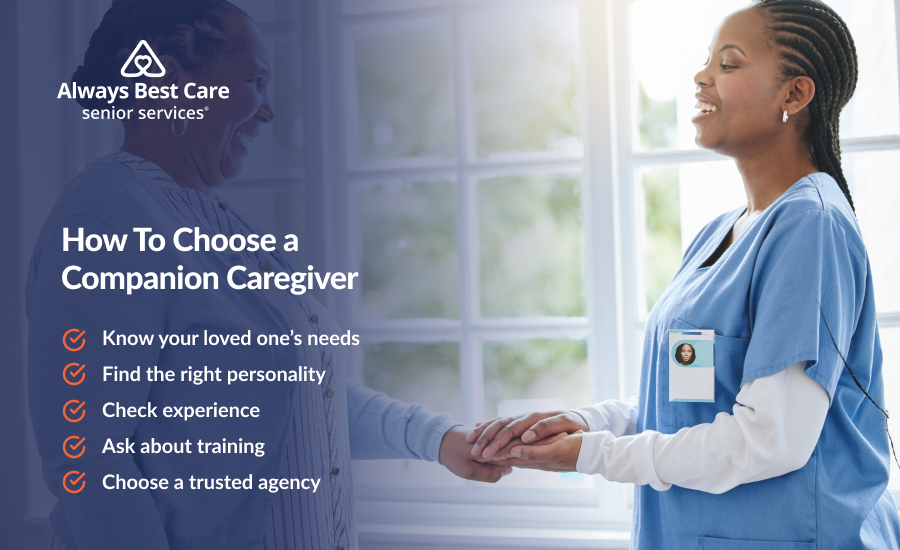Companion Care Services & How To Choose a Care Companion

Table of Contents
Companion Care Explained: Key Takeaways
- Companion care services include companionship, light housekeeping, and errand assistance
- Care companions improve an elderly individual’s quality of life by engaging in meaningful conversations or simply being present when needed
- This in-home care service doesn’t focus on providing medical care
Did you know that about 30% of adults age 65 and older lived alone in 2022?
The truth is, we all need human connection, as social interaction plays a big role in keeping our minds sharp and our bodies healthy.
But for many older adults living alone, especially those without family nearby, aging can bring not only physical changes but also feelings of loneliness and isolation.
In fact, social isolation has been linked to increased risks of depression, cognitive decline, and even heart disease among seniors. Simply having someone to share small moments with – a walk, a chat, or a shared meal – can significantly boost emotional well-being and overall life satisfaction.
This is where companion care makes all the difference.
In this article, we will:
- Explain the most common companion care services
- Highlight the key differences between companion and personal caregivers
- Guide you in choosing the right companion caregiver for your loved one
- Introduce reliable companionship services from Always Best Care
While many families initially consider companion care as a temporary solution, it often becomes a long-term source of stability and happiness. A trusted care companion can grow into a vital part of a senior’s support system-someone who not only helps with day-to-day routines but also becomes a familiar, comforting presence.
Common Companion Care Services
Companion care is a non-medical in-home service that offers a range of services that help make day-to-day tasks easier and more enjoyable for older adults.
Some of the most common services are:
- Companionship: This service includes enjoying conversations, playing games, sharing meals, or spending time together on hobbies. Even something as simple as watching a favorite movie or reminiscing over old photo albums can spark joy and create meaningful bonds between seniors and their companions.
- Light housekeeping: Care companions can assist with light housekeeping tasks like vacuuming, tidying up, grocery shopping, and even trips to the laundromat.
- Running errands and scheduling appointments: Caregivers can either accompany seniors on errands or handle them independently, depending on the person’s comfort level. They can also help coordinate appointments, provide reminders, and can take notes during medical visits to help keep families informed.
- Transportation assistance: If your loved one no longer drives or finds public transportation challenging, a care companion can help by arranging safe rides to appointments, social outings, and errands.

Companion Caregivers vs. Personal Caregivers: What’s the Difference?
Both companion caregivers and personal caregivers help older adults remain safe and comfortable at home, but the level of care they provide is different.
Here’s a quick comparison to help you understand which type of care might be right for your loved one:
| Type of Caregiver | Companion Caregiver | Personal Caregiver |
| Primary focus | Social interaction and emotional support | Hands-on assistance with personal care |
| Level of care | Non-medical, social and household support | Non-medical, physical assistance with daily living |
| Common services | Sharing meals, playing games, attending outings | Helping with bathing, grooming, (like toenail cutting), and mobility |
| Care setting | In-home | In-home |
| Goal | Minimize loneliness and reinforce independence | Ensure safety, comfort, and personal hygiene |
| Is medical care provided? | No | No, but assists with health-related routines |
How To Choose the Right Companion Caregiver
The right care companion does more than keep your loved one company; they help them feel seen, valued, and connected.
Here’s how to find a care companion who can provide support and comfort in your loved one’s daily life:
1. Identify What Matters Most to Your Loved One
Start by asking, “What would make my loved one’s day more enjoyable or easier?”
For example:
- Do they need regular company during meals to avoid feeling lonely?
- Would they enjoy playing board games or going for walks in the park?
- Do they need someone to help tidy the house or handle grocery runs?
Understanding these preferences can help you find someone who offers both the right skills and the right companionship.
2. Prioritize Personality and Compatibility
A care companion should feel like a trusted friend. Look for qualities like empathy, patience, and a good sense of humor.
For instance, if your mother likes gardening as a hobby, opt for someone who’s happy to get their hands dirty alongside her.
3. Ask About Experience and Communication
Hire someone who knows how to support seniors with empathy and patience. Ask about their past caregiving roles and how they’ve helped people stay socially connected.
A skilled companion listens with care and knows how to put someone at ease, even on a tough day.
4. Check for Certifications
Keep in mind that most companion caregivers in the United States don’t need formal certification.
While training is often encouraged, especially by reputable agencies, the heart of elderly companion care is providing meaningful social interaction and emotional support.
However, some caregivers choose to complete basic certifications, such as:
- Home Health Aide (HHA)
This better prepares them for unexpected situations and provides an added layer of safety and confidence for the families they support.
5. Work With a Trusted Agency
Choose senior services that screen its caregivers, provide training, and offer a backup plan if your regular caregiver is unavailable.
With a provider like Always Best Care, you can relax knowing every caregiver has passed a background check, is thoughtfully matched to your loved one, and has backup support ready if plans change.
6. Conduct a Trial Visit
Set up a few trial shifts to see how your loved one and the caregiver connect and pay attention to your loved one’s mood.
After the first visit, ask yourself:
- Does your elderly love one laugh more often?
- Does your elderly love one talk about their day?
- Does your elderly love feel calmer?
If not, keep searching until you find someone who is a good fit.
7. Stay Engaged and Adjust if Needed
Stay involved in your loved one’s care by regularly checking in with them and their caregiver.
These conversations help you catch small concerns early, whether it’s a scheduling issue, a change in mood, or an activity that no longer brings joy.
When needed, adjust the care plan to better fit your loved one’s evolving needs and preferences.
Ongoing communication keeps care meaningful and prevents small issues from becoming bigger problems.
It also helps your loved one feel heard and involved in decisions about their care. Including them in regular discussions shows respect for their independence and ensures the support they receive continues to reflect their personal values and lifestyle.

Find Companion Care Services at Always Best Care
At Always Best Care, we provide compassionate companion care that helps seniors feel connected, supported, and valued.
Our team understands that every senior has a unique story, set of interests, and rhythm to their day. That’s why we take time to learn about each client’s personality and preferences – ensuring companionship is not just a service, but a relationship built on mutual trust and comfort.
Whether your loved one needs help with daily activities or simply a friendly face to brighten their day, our caregivers are here to help them live life to the fullest, safely and comfortably at home.
At the heart of our care is the belief that every senior deserves not only safety and support but also joy, dignity, and human connection. Companion care is more than a service – it’s a lifeline to a fuller, more engaged life.
Companion Care: FAQs
What is companionship?
Companionship is the process of providing meaningful company to seniors to help prevent loneliness and isolation.
Companionship caregivers can also help the elderly with daily activities like light housekeeping, meal preparation, and running errands.
Are medical services included in companion care?
No, these services don’t include medical care. Care companions focus on emotional support, social interaction, and help with non-medical daily tasks.
They don’t perform clinical duties like wound care, administering medications, or managing medical treatments.
Who can benefit from elderly companion care?
Companion care is a great fit for seniors who:
- Feel lonely or isolated and would enjoy regular social interaction
- Need light help with daily activities like errands or housekeeping
- Are recovering from illness and need emotional support during the healing process
- Are adjusting to life changes, such as living alone after a spouse’s passing
Does insurance cover companionship services?
Most private insurance and Medicare don’t cover non-medical companion care.
Families often pay privately or use savings set aside for senior care. Check with your insurance provider and care agency to confirm your options.





